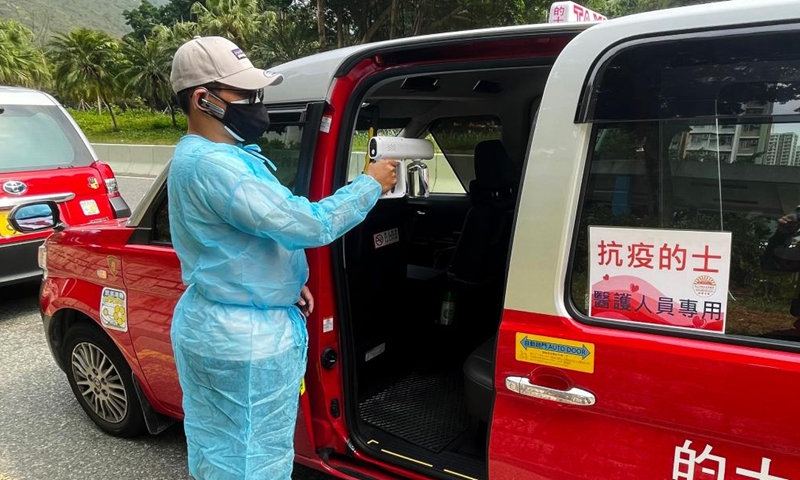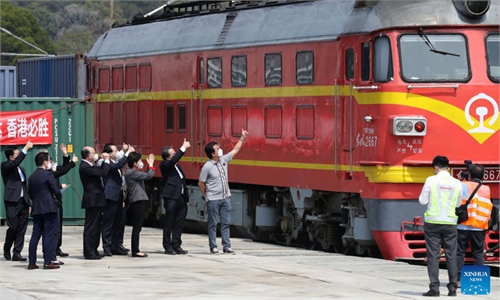HKSAR should uphold ‘dynamic zero’ policy to reduce severe cases and deaths as priority: top Chinese health expert

A taxi driver of the "anti-epidemic taxi" fleet disinfects his vehicle in Hong Kong Special Admininistrative Region, March 5, 2022. Photo:Xinhua
The Hong Kong Special Administrative Region (HKSAR) should uphold its "dynamic zero infection" policy with a phased approach and take measures as a priority to reduce COVID-19 infections, severe cases, and deaths with centralized medical resources, said Liang Wannian, head of the COVID-19 response expert panel under the National Health Commission.
In the HKSAR, the pandemic has infected many people in a short period, with many severe patients, severely draining medical resources, jeopardizing the lifeline of the city, and putting the city in danger of being unable to operate normally. "Hong Kong cannot choose to 'lie flat;' if it lies flat, the damage is infinite. We have to combat the virus to contain it, to stop its transmission and protect life as best we can," Liang stressed.
Hong Kong reported 25,150 new COVID-19 cases and 161 deaths on Monday, according to official data.
In the face of the severe situation in Hong Kong, Liang said the "dynamic zero infection" policy should be carried out in stages and steps. "Reducing the number of infections, severe cases and deaths is the most urgent and top priority for the city. After achieving the first goal, we will achieve the second and third goals," Liang said, noting that he has confidence that Hong Kong can achieve the goal of "dynamic zero infections."
At present, the top priority is to reduce the number of deaths, especially among the elderly and other key groups, Liang said, suggesting the relevant departments of the HKSAR government establish an indicator system to evaluate who is at risk of developing severe diseases and intervene in a timely manner.
He said critically ill patients often involve not only respiratory problems but also the failure of multiple organs. He suggested that an emergency and multidisciplinary model of centralized medical care should be adopted to bring those patients, related medical resources and personnel together to effectively prevent deaths. Also, the city should consider setting up a certain number of comprehensive and high-level hospitals as designated hospitals to treat severe COVID-19 patients.
Liang said he was glad to see that relevant departments have been studying and formulating plans to implement stratified treatment for patients. With regard to the treatment of severe cases, we have made suggestions to the HKSAR government to ensure effective connection between facilities, layout and different levels, so as to form an integrated treatment mechanism instead of fighting on its own, Liang noted.
The fifth wave of outbreak in Hong Kong is still on the rise and remains during an acute epidemic period. During the first four waves of the epidemic, 60 to 70 percent of COVID-19 transmission was effectively contained through a series of prevention and control measures taken by the HKSAR government.
As for universal testing, Liang said it was a systematic project and it needed to seize the moment. Many factors need to be considered and a thorough plan will be needed such as testing methods, delivery of samples, how the samplers are organized and how positive patients and close contacts will be managed.
"How can we take more effective and practical measures to stop the rising trend of the COVID-19 epidemic and reverse the situation as soon as possible? This is also one of the most important tasks in the current fight against the virus," Liang said.
Since the outbreak of COVID-19, the world has defined its strategies and overall goals based on social, economic, demographic, cultural, medical resource factors to combat the virus. China has always upheld the anti-epidemic concept of putting people and life first and has done everything possible to protect people's health and lives, Liang said.
China has followed the policy of "dynamic zero infection," which does not mean that it is pursuing zero infections, as it is very easy for the virus to spread. A significant proportion of cases are asymptomatic, and the symptoms of which are not as easily recognized and diagnosed as those of other infectious diseases, according to Liang.
How to quickly detect and identify the cases once people are infected, and take measures to cut off the transmission route and protect vulnerable people from being infected? "That's the essence of dynamic zero infection; it's incorrect to interpret it as zero infections," Liang said.


